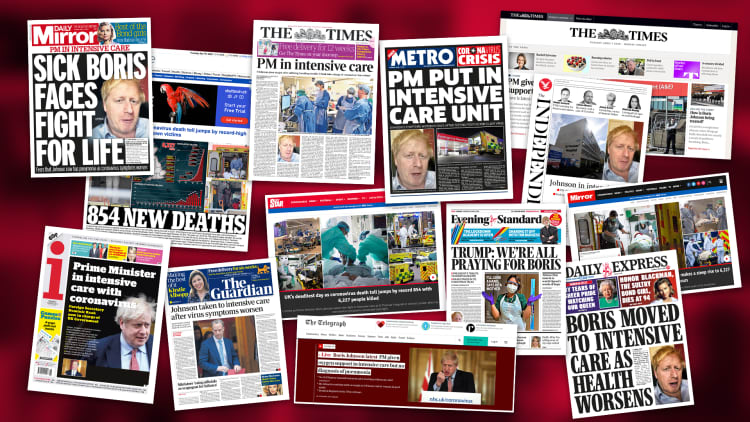As millions get used to the new normal of lockdown life, our digital lives may never be the same again.
From video conference calls with family, watching as kids learn via online education to streaming online workouts, lots of things have changed — and post-pandemic, some of these habits are likely to stick.
"We just assumed that certain services in our society and our economy were provided in-person and required co-location. And I think those assumptions are now radically being challenged," according to Carsten Wierwille, CEO of digital product developer Ustwo, who spoke to CNBC by phone.
People can expect better service from businesses that have had to hone online customer experience, improve digital entertainment and create easier ways to buy big-ticket items — but on the flipside, we might also become less protective of our personal data, according to some experts.
Easy e-commerce
Companies that had been grappling with integrating technology have had to act quicker, according to Nigel Vaz, global CEO of digital consultancy Publicis Sapient. "This terrible crisis is acting as an accelerator to almost help people not have to imagine a future, but face a future that they were only imagining six months ago," he told CNBC by phone.
This new investment in technology could make consumers' lives easier.
For example, Vaz has been helping automotive clients build a digital configurator, where people can choose elements of their cars online. Now, customers are asking automakers to deliver cars direct to their doors, without seeing or test driving them, he added. "For me, this is a seminal step forward for automakers," Vaz said.
Publicis Sapient clients include Audi and Nissan, and it also works for energy suppliers British Gas and Ontario Energy Board.
Specialist telemedicine software, which has seen a huge rise in demand from U.K. family doctors treating patients who are self-isolating, might also become mainstream, Wierwille suggested. Video calls to check people are doing follow-up exercises after a physio appointment could become more commonplace, for example.

A rush to digital may also mean better customer service too. Clients are asking Publicis Sapient to create tools using artificial intelligence to help mitigate huge spikes in calls to contact centers, for example.
"It's moving from just being reactive to proactive," Vaz said. For example, internet providers tracking how much data customers are using might automatically extend their limit.
But along with getting better service, people might also lower their barriers when it comes to sharing their data. "People … are willing to trade their data and privacy concerns for convenience and service," he said. This might include signing up to an online food delivery service, where previously someone may not have been willing to sign up because they didn't want to share their personal information.
Governments around the world have gathered data on their citizens for contact tracing, but privacy experts have raised concerns about the potential for authorities to maintain levels of surveillance even after the pandemic is over.
Culture shift
When it comes to work life, more introverted staffers are seeing benefits from the rush to digital. As companies hold online all-staff meetings with people signing in from home, executives are seeking feedback through online Q&A tools such as Slido — and employees who would usually be shy to speak in person are asking questions online.
Wierwille at Ustwo said these virtual meetings can be a leveler. "People asked a lot more questions and I realized that particularly the more introverted people were more willing to come out … The team dynamic has changed … you normally have the more senior people that dominate a meeting: now the balance of that is more equally spread," he told CNBC.
Wierwille also expects to travel less once things go back to normal. Getting used to Zoom calls and tools like Mural, a digital whiteboard, or presentation software Prezi, might mean people are less likely to fly to meetings. "I always assumed that I have to travel to see clients and we have to meet our clients in person in order to do the work. And maybe we don't have to do that as much," he said.

And along with the avenues opened up by digital messaging tools, social media has become friendlier, according to Callum McCahon, Strategy Director at agency Born Social. "Over the past few years, social has become a passive place — consumers often mindlessly scrolling through the feed, with advertisers using it as another reach channel to drive eyeballs. But over the past few weeks, we've seen behaviors completely flip into the more social side of the platforms," he told CNBC by email.
People are joining coronavirus support groups on Facebook; live video is on the up — driven by the likes of cooking classes and yoga lessons — and video chat apps like Houseparty are growing in popularity. Post-pandemic, McCahon expects some return to previous habits but hopes that social media will be a happier place overall.
Entertainment boost
As well as turning to streaming services such as the new Disney+, which last week saw shares rise as it announced it now has more than 50 million subscribers, people can expect other forms of entertainment to reach a wider audience.
Gaming, especially esports, will push further into the mainstream, according to James Draper, CEO of Bidstack, a company that provides in-game advertising. As other sports fixtures are canceled, stars such as the NBA's Kevin Durant are taking part in esport contests shown via traditional broadcasters such as ESPN. "The biggest change in how technology will be used post-pandemic is in the take up of esports by sports broadcasters. Esports is … a growing area but the current crisis has highlighted the importance of accelerating its adoption for athletes, sporting organizations, teams and commercial rights holders," Draper told CNBC via email.
Parents can expect to continue digital classes for their children: online education providers have seen huge spikes in activity, with education tech company Brainly seeing usage go up 200% through March. "We will never go back to the way we treated online education before — this is the silver lining for the education system," Brainly's Chief Business Officer Eric Oldfield told CNBC by email.
And as consumers seek information on how to deal with the crisis, online publishers have been happy to furnish their needs. Online publishing company Future, which runs websites including tech platforms T3 and TechRadar, as well as education sites such as Creative Bloq, has seen traffic surge, according to the company's Director of Audience Sam Robson.
One question for content providers is whether they will be able to keep some of that audience when life goes back to normal. Robson doesn't expect to maintain the current numbers post-pandemic, but neither does he expect figures to go back to where they were.
"Remote working and learning, increased gaming and streaming, greater adoption of food delivery, meal kits and even alcohol delivery, are all likely to continue … Generally, consumers start their journey on Google, so we create content that answers the queries they are searching for," Robson added.

